
Hibiscus rosa-sinensis, known colloquially as Chinese hibiscus, China rose, Hawaiian hibiscus, rose mallow and shoeblack plant, is a species of tropical hibiscus, a flowering plant in the Hibisceae tribe of the family Malvaceae. It is widely cultivated as an ornamental plant in the tropics and subtropics, but its native range is Vanuatu.

Rosa gallica, the Gallic rose, French rose, or rose of Provins, is a species of flowering plant in the rose family, native to southern and central Europe eastwards to Turkey and the Caucasus. Rosa gallica was one of the first species of rose to be cultivated in central Europe. It is a parent of several important cultivars.
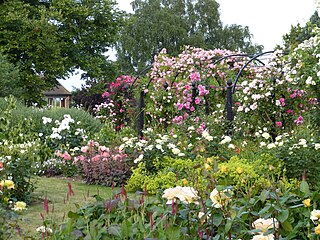
The Royal National Rose Society (RNRS) (1876-2017) was a specialist horticultural organization in the United Kingdom dedicated to the cultivation and appreciation of roses. Founded in 1876 as the "National Rose Society", it was the world's oldest plant society. It was a membership organisation, with members drawn from professional and amateur gardeners and horticultural businesses. Originally based in London, the rose society moved its headquarters to Chiswell Green, near St Albans, Hertfordshire in 1959, where it created the Royal National Rose Society Gardens. In 1965, the society changed its name to the "Royal National Rose Society" (RNRS). At the height of its popularity, the RNRS had 100,000 members and its gardens contained 30,000 rose shrubs. The organisation was dissolved in May, 2017 and the gardens were closed permanently.
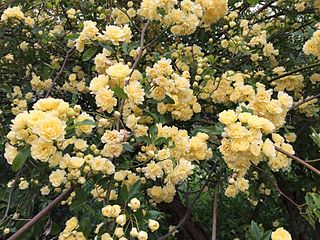
Rosa banksiae, common names Lady Banks' rose, or just Banks' rose, is a species of flowering plant in the rose family, native to central and western China, in the provinces of Gansu, Guizhou, Henan, Hubei, Jiangsu, Sichuan and Yunnan, at altitudes of 500–2,200 m (1,640–7,218 ft). The rose is named for Dorothea Lady Banks, the wife of the botanist Sir Joseph Banks.

The Royal William rose, registered under the cultivar name "KORzaun", is a red hybrid tea rose. It was developed by Reimer Kordes from the cultivar 'Feuerzauber' and is available under several other marketing names, such as Fragrant Charm, Duftzauber, La Magie du Parfum and Leonora Christine.

Rosa virginiana, commonly known as the Virginia rose, common wild rose or prairie rose, is a woody perennial in the rose family native to eastern North America, where it is the most common wild rose. It is deciduous, forming a suckering shrub up to 2 metres in height, though often less. The stems are covered in numerous hooked prickles. The leaves are pinnate, usually with between 7 and 9 glossy leaflets. The pink flowers are borne singly or in small clusters and appear over a long period in midsummer. The fruits are small, round and bright red, rich in vitamin C and edible, being both used to make jams and tea. It grows in clearings, thickets, and shores. The plant attracts birds, bees, butterflies, and hummingbirds.

Rosa 'Ingrid Bergman' is a red hybrid tea rose, bred by the Danish rose growers Pernille and Mogens Olesen and introduced by their company Poulsen Roser in 1984. It is a cross between the red hybrid tea 'Precious Platinum' and an unnamed seedling. It was named in honor of the Swedish actress Ingrid Bergman (1915–1982).

Rosa 'Arthur Bell',, is a yellow rose cultivar, bred by Sam McGredy IV in Northern Ireland in 1964. The rose has won numerous awards, and is popular in England and Northern Europe.

Erigeron aureus, the Alpine yellow fleabane, is a species of flowering plant in the family Asteraceae, native to the Cascades and Rocky Mountains of northwestern North America. The specific epithet aureus means "golden yellow".

Rosa 'Cécile Brünner', also known as 'Mlle Cécile Brünner', 'Sweetheart Rose', 'Malteser Rose', or 'Mignon', is a light pink polyantha rose bred in France by Marie Ducher and introduced by her son-in-law, Joseph Pernet-Ducher in 1881. Its parents were a double-flowered R. multiflora and a hybrid tea rose, either 'Souvenir d'un Ami' or a seedling of 'Mme de Tartas'. It is not clear if the rose was named after the sister (1853–1927) or daughter of Ulrich Brunner fils.
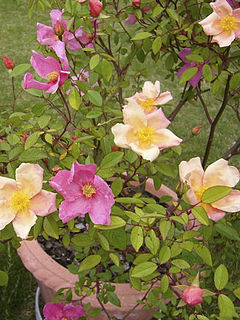
Rosa × odorata or Rosa odorata is a hybrid flowering plant of the genus Rosa native to Yunnan in Southwest China, whose taxonomy has been confused. It has been considered a hybrid of Rosa gigantea and Rosa chinensis, or as a quite rare wild species that includes R. gigantea. The wild forms are cultivated to some extent. Cultivars were developed in China in ancient times from R. chinensis crosses, and these have been important in the ancestry of the tea-scented China roses, also called tea roses, and their descendants the hybrid tea roses.

Rosa'Buff Beauty' is an apricot Hybrid musk rose cultivar, bred by Ann Bentall and introduced into Great Britain in 1939. Bentall and her husband, John Bentall, inherited the rose fields of acclaimed rose breeder, the Reverend Joseph Pemberton after his death in 1926. The rose was awarded the Royal Horticultural Society's Award of Garden Merit in 1993.
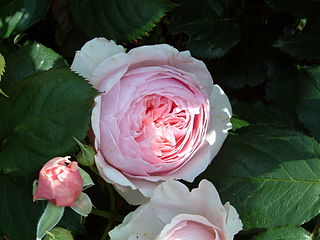
Rosa'Constance Spry' is a light pink shrub rose introduced into Great Britain in 1961. It is the first rose cultivar commercially developed by British rose breeder, David C.H. Austin. 'Constance Spry' was introduced at a time when the shrub rose was out of style, the hybrid tea rose being the most popular rose with gardeners. The new cultivar renewed the popularity of the more old fashioned type of rose.

William A. McNamara is an American horticulturist and expert in the field of plant conservation and the flora of Asia. Now retired, he was the President and Executive Director of Quarryhill Botanical Garden, a 25-acre wild woodland garden in Northern California's Sonoma Valley featuring wild-sourced plants from temperate East Asia. In 2017, he and Quarryhill Botanical Garden celebrated their 30th Anniversary. He retired from the Garden in October of 2019.

Rosa 'de Rescht' is a Portland Damask rose introduced by English gardener Nancy Lindsay in 1945. In the first part of her book The Genus Rosa, Ellen Willmott described a rose that is known by the Gilaks as "Gul e Reschti", which is probably the same as Rose de Rescht.

Eriocapitella × hybrida is a hybrid of flowering plants in the buttercup family Ranunculaceae. The parents of the hybrid are E. japonica and E. vitifolia. Cultivars of the hybrid are commonly known as Japanese anemone hybrids.

Begonia rex, the king begonia, is a species of flowering plant in the family Begoniaceae. It is found from Arunachal Pradesh to southeast China, and has been introduced to Bangladesh, Cuba, and Hispaniola. It is a parent to over 500 cultivars in the Begonia Rex Cultorum Group of houseplants. Other parents in the multitude of crosses made during the creation of the Group include Begonia annulata, B. cathayana, B. decora, B. diadema, B. dregei, B. grandis, B. hatacoa, B. palmata, and B. xanthina.
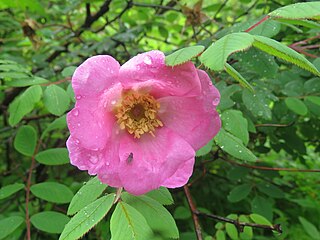
Rosa macrophylla, the big-hip rose, is a species of flowering plant in the family Rosaceae, native to the Himalayan region. There are a number of cultivars, including 'Doncasteri', 'Glaucescens', 'Master Hugh', and 'Rubricaulis'. 'Master Hugh' has the largest hips of any readily available rose.


















